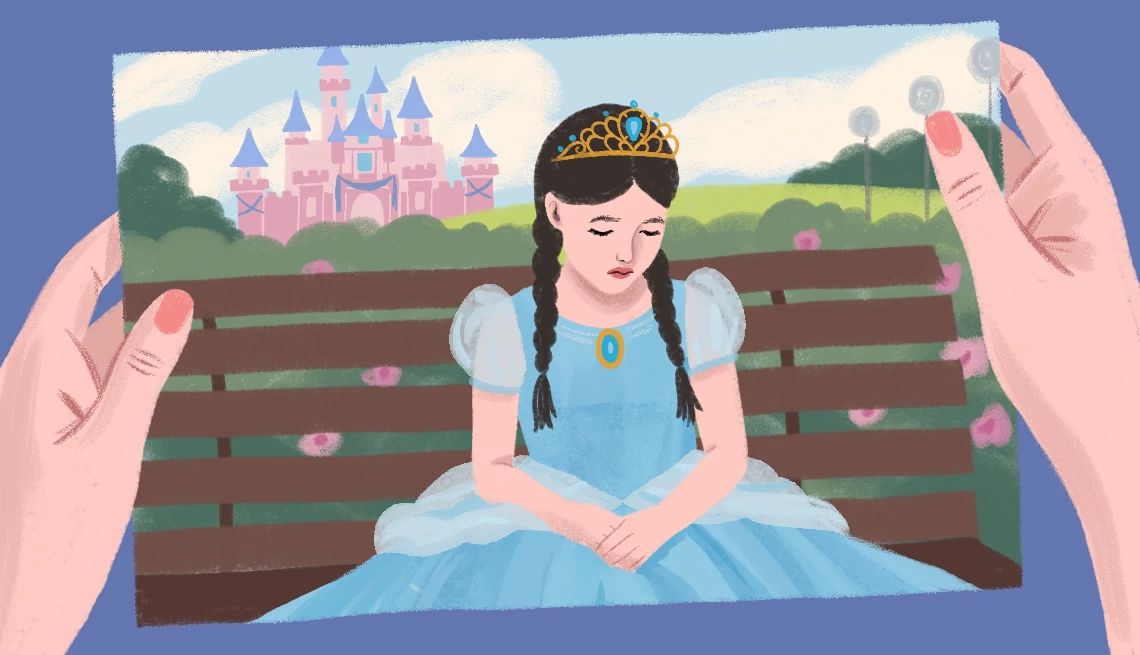AARP Hearing Center


Welcome to Ethels Tell All, where the writers behind The Ethel newsletter share their personal stories related to the joys and challenges of aging. Come back Wednesday each week for the latest piece, exclusively on AARP Members Edition.
“Ohhh, I don’t like to talk about Disney.”
My daughter said those words when a television commercial advertising the so-called “Happiest Place on Earth” thrust the topic into our living room. I felt a heavy pit in my stomach, my heart ached, and my brain screamed, Change the topic, Suzanne, and change it quickly!
I don’t like to talk about Disney, either. In fact, I hate it. When it comes up, my defenses rise, regret eats away at me, and the self-hatred I felt for decades returns. But for some reason, in that moment, it brought me comfort to hear my daughter speak a truth that was so close to my own, one which I was afraid to speak. She is so damn brave, I thought.
It has been 14 years since our first and only trip to the Magic Kingdom. Just as any princess-loving 7-year-old would be, Molly was ecstatic to experience all the theme park had to offer. She wasn’t your typical 7-year-old, though. She was forced to grow up too quickly. She was a caretaker of her siblings and her mother, roles she didn’t choose. She lived with fear and shame and far too much responsibility. She was the child of a sick and suffering alcoholic mother, and she deserved a magical escape more than anyone.
Unfortunately, alcoholism doesn’t take vacations, and on that trip, my alcoholism showed up every single day. Drinking vodka in the morning, stumbling at the park, I inflicted a great deal of worry, embarrassment and shame on her that week. There were days when she and her dad left me in the hotel room while they explored the park, and I like to believe that on those days she made some good memories, but I know she was worried about me then, too.
I fear that the trip for Molly will always be filled with sad memories, that it will always remind her of my sickness, our shame and the chaos in which we lived. There may be no erasing that for her. There is no erasing it for me. Not even after 11 years of sobriety, healing, apologies and forgiveness.
In an AA meeting some time ago, I stood up and shared my full story, from drunk to sober. I shared many of my parenting lows: all the broken promises over the years, driving under the influence with my kids in the car, being separated from them for six months while in rehab. After the meeting, another mother, newer to the sobriety journey, approached me. “I loved hearing your story,” she said, “and to hear you talk about all those bad times without crying is amazing. It shows that you forgive yourself. I can’t imagine ever forgiving myself.”
She was right. I used to struggle to share the stories of who I was because the guilt and regret were too intense. The more I spoke, though, the more I was able to breathe through my tears, accept the past and ultimately forgive myself. As I shared who I used to be, I started to realize who I was becoming: a reliable, honest and trustworthy mother. I was becoming a mother who created order, not havoc; love, not disdain; pride, not embarrassment. Sobriety taught me how to live without alcohol. It was teaching me how to forgive, too.




































































You Might Also Like
Mom Wants Me to Have Her Lladró Figurines
Can I sell them and pocket the money?
Politics Is Ruining My Marriage
Our experts weigh in on how to save a loving partnership being taken over by politics
25 Healthy Snacks to Eat After Age 50
Craving a sweet or savory bite? Try these